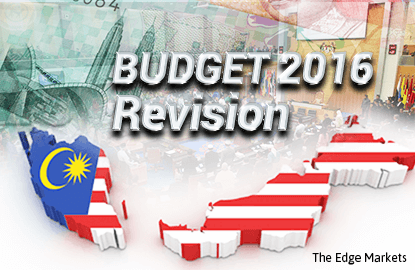
PUTRAJAYA (Jan 28): Malaysia kept its 2016 fiscal deficit target intact, as widely expected, but trimmed its growth forecast for the year, as the government revises 2016 state budget because of falling oil prices.
Prime Minister Datuk Seri Najib Razak said the government is maintaining its fiscal deficit target of 3.1% of gross domestic product for 2016 in the revised budget, but expects the local economy to grow between 4% and 4.5% this year, down from an earlier forecast of 4%–5%.
In a special address today, the prime minister said the government will introduce 11 measures to spur domestic consumption that include reducing contribution to the Employees Provident Fund (EPF).
These recalibration efforts are expected to save up to RM9 billion in operating and development expenditures, he added.
In October last year, the government had announced an allocation of RM267.2 billion for Budget 2016, of which operating expenditure amounted to RM215 billion while development expenditure amounted to RM49 billion.
Najib also noted that the revised budget assumed that crude oil would trade at US$30 to US$35 a barrel, from US$48 a barrel previously.
No major projects with high multiplier effects have been shelved, he added.
The 11 measures meant to boost consumption are:
1) Reducing employees' contribution to the EPF by 3% beginning March 2016 to December 2017, in order to increase private consumption expenditure by RM8 billion a year. Employers' contributions remain as they are now.
2) Providing a special tax relief of up RM2,000 to individual taxpayers with a monthly income of RM8,000 or below for the year of assessment 2015. Najib said the government will forego RM350 million in revenue, but 2 million individuals will enjoy tax savings of up to RM475 each.
3) Lightening the rakyat's cost of daily basic necessities. Some of the initiatives are to liberalise the control on import quotas or approved permits on eight agriculture produce temporarily to ensure consistent supply, establishing MyFarm Outlets with prices that are up to 20% below market prices, giving RM50 to paddy farmers for every tonne of cleaned paddy to encourage production, and supplying 20 kg of rice every month to hardcore poor households until December 2016.
4) Mandating that houses priced RM300,000 or below are for sale to first-time homebuyers only.
5) Thirty percent from the levy contribution to the Human Resources Development Fund amounting to RM200 million will be provided to enhance the competency and skills of employees, including retrenched workers.
6) Enhancing tax collection efficiency and amount. The government will double compliance and auditing efforts on tax evaders, restructuring selling channels of duty-free cigarettes and liquors to reduce leakages which resulted in revenue loss of nearly RM1 billion, and tightening free duty treatment on imported vehicles on duty-free islands.
7) Streamlining management of foreign workers system whereby the levy will be clustered into two categories only, which does not include foreign domestic maid category. Government to implement Rehiring Programme to provide opportunities for foreign workers without permits (PATI) to be given valid work permits, in a bid to fulfill industry demand as well as to enable the government to ascertain the number of PATI for security monitoring.
8) Prudent spending, particularly on supplies and services; continue efforts to rationalise provision of grants to government trust funds, federal statutory bodies and government-linked companies (GLCs); as well as rationalise and restructure entities, including companies limited by guarantee (CLBG) and statutory bodies.
9) Focusing on rakyat-centric projects and programmes, as well as projects with high multiplier effect and low import content. Affordable houses, hospitals, schools, roads, public transport and security projects to be prioritised. This will reduce up to RM5 billion in cash flow commitments, but will not affect the economy.
10) Development finance institutions and government-owned venture capital funds to increase financing funds by RM6 billion to provide financing to small and medium enterprises and start-up companies.
11) Urging GLCs to implement the initiative to narrow the income gap between higher management and employees gradually, with the rest in private sector urged to follow suit.
Additionally, Najib said there will be a visa waiver for tourists from China between March 1 and Dec 31, provided their stay does not exceed 15 days.
Meanwhile, Najib dismissed concerns that the country could face a possible recession or economic crisis.
"The government has been vigilantly monitoring the situation," he said.
"We are not in crisis. Indeed, we are taking pre-emptive measures following the changes in the external global economic landscape which is beyond our control. This is to ensure that our economy continues to attain a respectable and reasonable growth," he added.